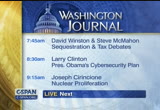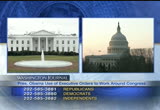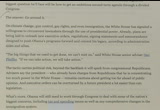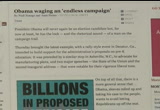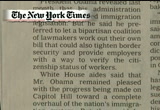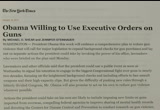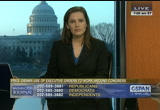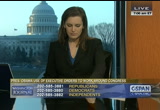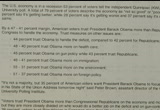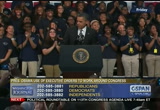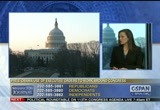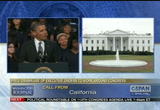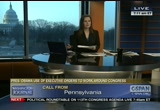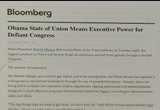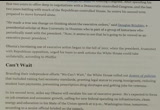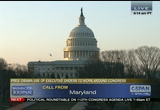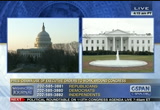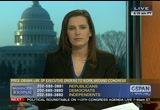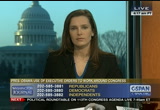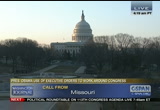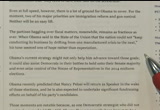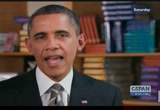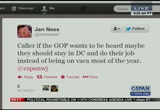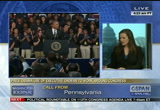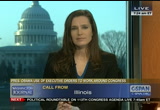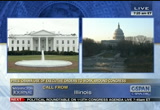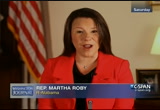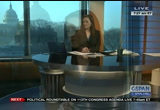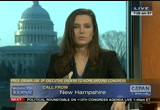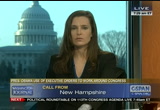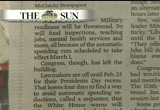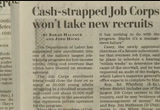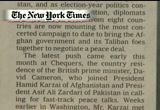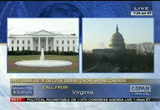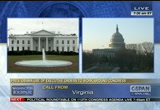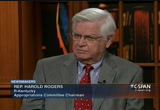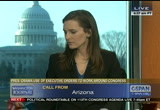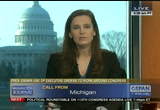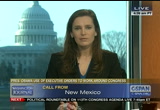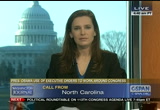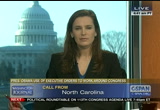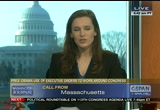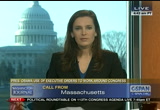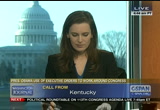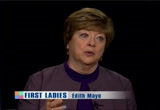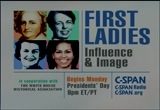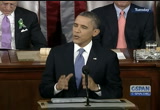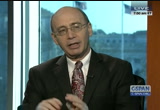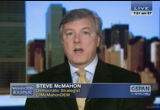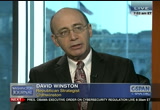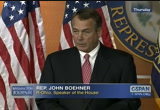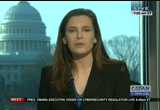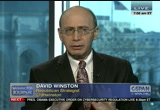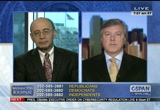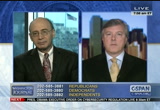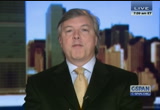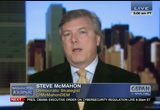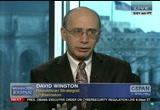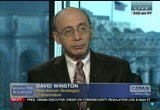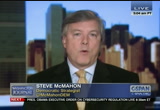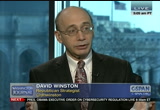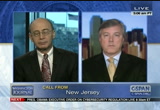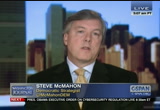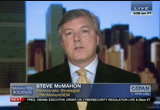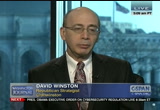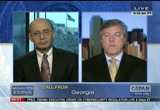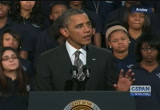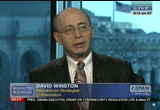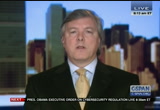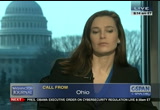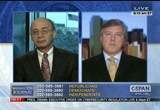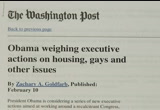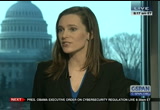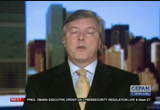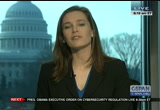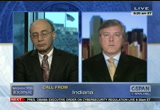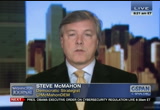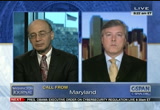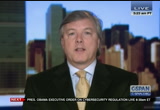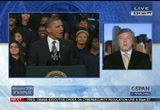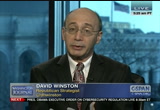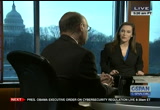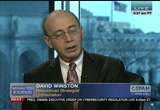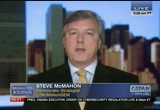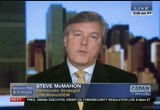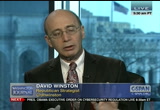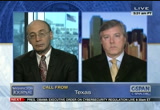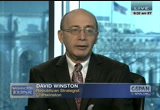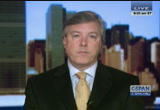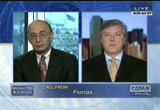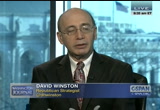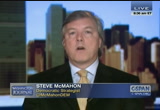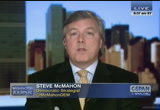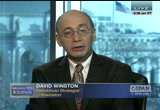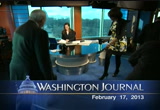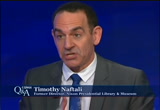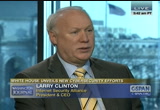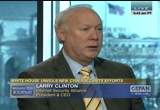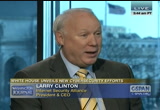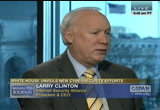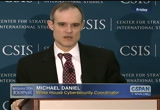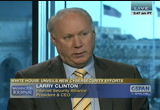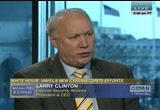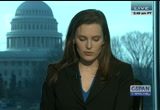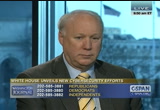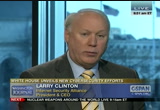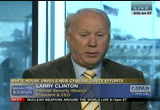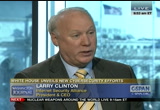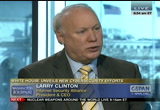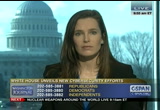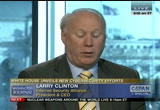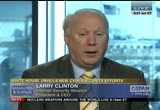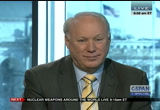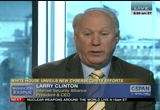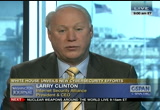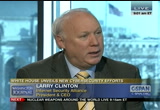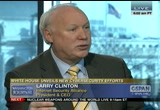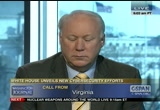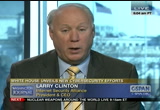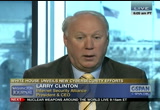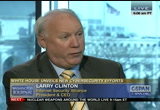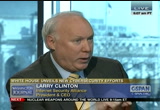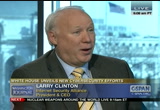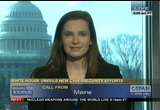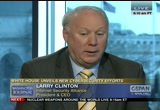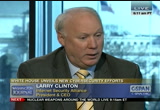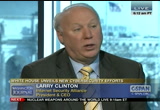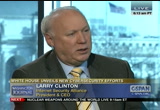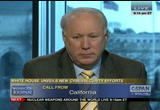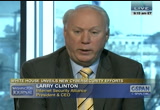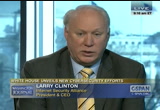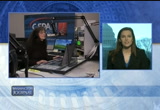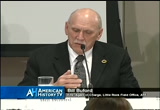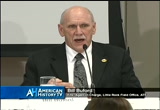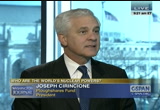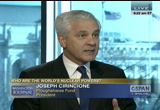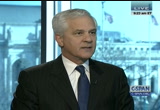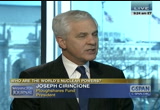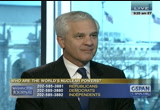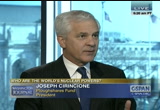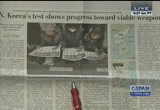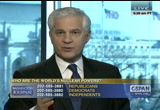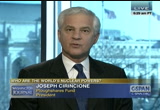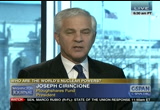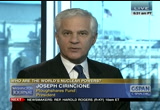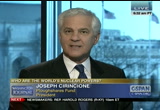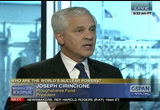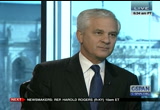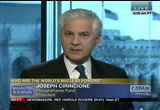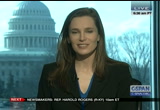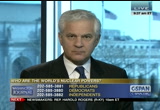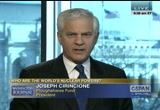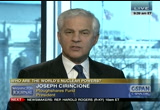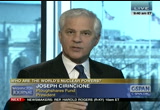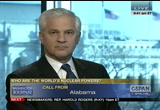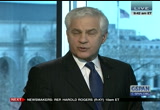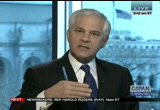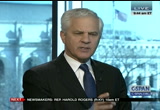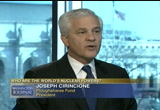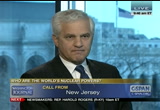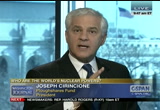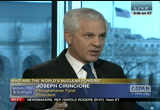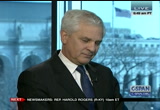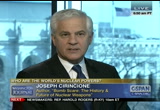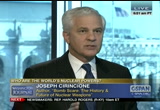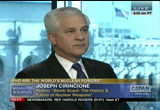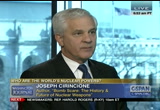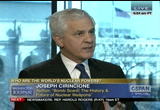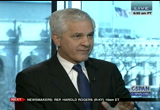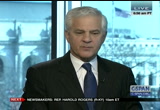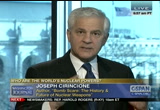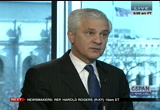tv Washington Journal CSPAN February 17, 2013 7:00am-10:00am EST
7:00 am
tax federal spending. then, larry clinton on the federal cyber security alliance. then a talk about north korea's nuclear program. ♪ host: good morning, welcome to "washington journal." "the new york times" reports that the white house is working on an immigration bill as a backup plan. in case congress does not come up with its own legislation. the president is seeking executive action. we would like to hear what you think about president obama using executive orders to work around congress. here are the numbers to call.
7:01 am
7:02 am
host: looking at one of the executive orders that he assigned -- that he signed an tuesday, it relates to cyber security and cyber issues. the president issued an executive order designed to strengthen the cyber security of critical infrastructure last week, which some say could get the ball rolling for a renewed legislative push in congress. it contains some provisions of the bill in the sharing and protection act that failed past. the president is waging an endless campaign. president obama will never again be an election candidate, but for now he has "the look and sound of the man on the campaign trail." he met with a rally style event in decatur, ga.. it was preceded by a similar
7:03 am
stop in asheville, north carolina. there were two major speeches that were notable for their vigorous liberal tone. what you think about the idea of the white house using executive orders and other means to work around congress? here is a story about immigration in "the new york times" this morning. 11 million illegal immigrants given pathways to citizenship along with the principles the president laid out in las vegas. the president revealed last month that his administration already drafted an agreement of the legislation but that he refer -- preferred a bipartisan coalition of lawmakers.
7:04 am
7:05 am
host: let's go to our next call from judy in louisiana. caller: good morning. how are you? host: good, how are you doing? caller: i am all right. host: what do you think of the president using executive orders in this way? caller: i am appalled. if you look back in history, it does not happen like this. this definition is like a imperial ruler, like this are -- aczars.
7:06 am
people on one side have representatives, people on the other side should have representatives. rather than going to them to find out what the people want, he literally goes to these czars. this bit about republicans not wanting to talk? that is ridiculous, no one will talk to them. he says that if you do not do it my way, i won the election. the 49% of us that do not want these changes -- the best example in chicago. chicago with guns, they have the worst record for guns. they literally pass laws that are not legal according to the supreme court. the supreme court went through years of reviewing this. they made a decision. what did the mayor of san --
7:07 am
what did the mayor of chicago say? fine. they use executive orders and they used the courts, i guess, if they do not get what they want, to tie it up and wear down everyone. literally circumventing what i think is the constitution. host: you mentioned the constitution. here is a poll that says by a 37 to 41% margin the american voters' trust president obama more than republicans in congress on the economy. 42% to 48% on health care, with 45% trust and the president on gun policy more of 43% trust republicans with gun policy.
7:08 am
on the issue of the environment, 55% trust president obama more. foreign policy, it is 51% to 37%. theresa, nevada. caller: regarding president obama using executive orders to go around the republicans in the house, i am all for it. i am aware that this is a two- party democracy and we need republicans to be reasonable working party, but they have not been. the president has no choice but to go around them. john boehner has walked away. i am frustrated and the country is frustrated, other democrats are frustrated and scared. i am scared of the things
7:09 am
they're willing to do to our country. he is doing what he has to do. i am all for his proposals, all for clean energy and comprehensive immigration, i am for gun legislation. i am for all of them. i am center-left, that is progressive. i think the country is definitely going progressive. i do not understand where the republicans want to obstruct and go with their small mindedness and small government proposals that they think that they can push through on the american people that i do not think are very popular. host: we have a different opinion from twitter. host: david wright's in on twitter and says --
7:10 am
host: dan is up next in california, republican. caller: hello. i would like to reiterate what was just said. i am a retired federal employees. executive orders used to come few and far between. this president is misusing them to an extreme degree. as the lady put it a little bit ago, executive orders are not meant for executive fiat of anything the president dreams. he is going to ruin the balance of power in this country if he keeps it up. i think he should be impeached for what he has done. host: what you think of the
7:11 am
callers who have spoken up and said that congress is not moving and someone has to get something done? caller: that may be the case, but will we do is get congress moving by building a fire under them by making phone calls to them. this government is not set up to be in a balance. when the president tries to make executive fiat for everything that comes down the pike? that is what we have three branches for. host: raymond, clinton, pennsylvania, independent caller, welcome. caller: i agree with some of your callers that this is exactly what he is doing, trying to go around the congress. to his supporters, i say this, if that is what you believe will not do away with congress and let this guy be a star for the next 30 years? ask your callers this -- between
7:12 am
the terms for presidency, would they support the without congress or the states obtaining it? getting ready for the banking on those appointments with the national labor relations board, he has defined the court. he is going against a lot. it is a dangerous precedent, because one day the people are going to say the we are no longer going to obey the law. were you going to do, come down with the troops? i do not think so. host: bloomberg reported last week that the president will still need to work with congress to deal with the nation's biggest concerns, including tax and spending issues and comprehensive changes to the immigration system. she points out that the use of
7:13 am
this power is not new, that second term presidents have been more willing to flex their authorities. this shift to a more a sort of use -- assertive use of power market changed from president obama, who had accused president bush of flouting congress. after spending two years deep in negotiations with congress and battling with much of the republican controlled house, president obama enters his second term prepared to move forward alone. in houston they said that he may be true sea change in thinking about executive orders. host: let's hear from our next caller. dennis in maryland, democratic
7:14 am
line, hello. caller go -- caller: first of all, thank you for the opportunity. i think -- i think that it is a good thing that the president has this power. because if not, a small group of right wing nuts in that congress up their that has been described as the worst do nothing congress almost in american history -- if the president did not have the power, we would never get anything done. they know it and we know it. they are already going to let this country go into another recession if it goes into sequestration. the man got us out of the first one and they're trying to get this country into another one.
7:15 am
if it is clear that they are acting like children and the president is the grown up in the room. that is about all i want to say. thank you. host: more from bloomberg -- "he is expected to emphasize clean energy and at -- and education, pushing lawmakers on immigration, gun control, and climate change. last month he initiated the 23 executive actions on gun control as part of a legislative package after the december killing in a new town elementary school. allen, republicans lined.
7:16 am
caller: thank you for c-span. host: good morning. caller: i have three things i want to talk about. the constitution, the rule law, and cyber-attacks. in terms of the lady who called and said that she was left-wing progressive? what you had said this morning in terms of the polling, i do not care what amount of pulling someone takes, we are either a country under the rule of law and we abide by the constitution, especially the second amendment right of speech, like we are doing today in talking to you -- it baffles me, because as she tries to make it so elegant, the president needing to do an executive order because of a do nothing congress -- i say that it is very simple, if they are
7:17 am
going to do nothing, they get no pay. especially in the senate. the gentleman from maryland, i agree with him that there is a do nothing congress, but it is the senate, harry reid who is the do nothing. they have passed legislation for the last two years in the house of representatives, since the republicans had control. what happens? nothing. the senate sits on it and does nothing. second i want to -- want to talk about fiber. there is technology available today where each individual home could be self-sufficient -- self-sufficient with its own energy sell. what is amazing is if we have 500 years of natural gas, there it is. nobody can attack us if every household has energy. we eliminate the grid because
7:18 am
everyone has the wrong grade. there is a company in california that is powering e day using methane gas. that company is blue energy of california. host: the president signed an executive order last week regarding cyber security. some news about that, they intended to improve information sharing to establish a framework of cyber security best practices. "the white house spent the last several months crafting the order after congress failed to pass cyber security legislation last year. -- last year." we will talk more about this executive order at 8:30 with larry clinton, president and ceo of the internet security alliance.
7:19 am
next, gil, missouri, democratic line. caller: it does not surprise me , an executive order once a month on something. in 1913 they passed a 17th amendment. the senate is bought by the wealthy along with the house of representatives, meaning we do not have a senate, we have two houses now. since they have done that, they can do what they want. insider-trading, vote on visa cards and make money doing it. they do not enforce the monopoly laws. the laws that are important for the people. it is what they can make money on. we need to repeal the 17th amendment and we should take a good look at everything they have passed ever since the 17th amendment.
7:20 am
i have a copy of the constitution sitting right here and it says most states -- there were three or fourth stage that did not consent to the 17th amendment. host: all right, dale, missouri. let's look of a story that looks at this from the bill, "the president's endless campaign taking the message to the road." for the moment two of his major priorities are immigration reform and gun-control, neither of which will be an easy left -- easy lift." host: the president gave his weekly address yesterday.
7:21 am
let's take a listen to what he had to say about the middle class. [video clip] >> every day we should be asking ourselves good questions. how do we get good jobs coming to america and how do we may sure your hard work making america a magnet for new jobs and manufacturing. our manufacturers have added about 500,000 jobs over the past three years. what we need to do now is simple, accelerate that trend into global centers of high-tech manufacturing. we need to make the tax breaks -- take the tax breaks away from companies that send jobs overseas. we need to invest in the research in technology that will allow us to put more people back to work repairing crumbling
7:22 am
roads and bridges. these steps will help us to expand and create new jobs, providing every american with skilled training that they need to fill those jobs. let's start in the early years by offering high-quality preschool to every child in america. let's redesign our high schools so that the students graduate with skills that employers are looking for right now. because taxpayers cannot continue to subsidize the soaring costs of higher education, i have called on congress to take affordability into account when determining which colleges need certain kinds of federal aid. host: that is the president's weekly address. jan rights this on twitter -- host: what do you think about the president's use of executive orders as a way to achieve his goals of working around congress? our next caller comes from
7:23 am
pennsylvania, rose, republican line. caller, how are you? host: good, how are you. caller code nervous, in a first- time caller. host: welcome. caller: thank you. i think that obama is trying to turn this country into a dictatorship. everyone that does not agree with his policies, that is why i recently became a republican. host: is there anything in particular that the president is doing that makes you feel that way? caller: he is so involved with social issues rather than trying to get jobs for the country. employment should be a priority instead of all these social issues. host: if the president signed an executive order to spur growth in jobs and manufacturing, would you have a problem with that?
7:24 am
caller: well, i agree with people coming together, republicans and democrats. everything cannot just go the way of democrats. host: everyone working together. caller: exactly. host: thank you for calling. this is robert from twitter -- host: democratic line, illinois. good morning. caller: first of all, thank you for giving me the opportunity to speak on this issue. we have a congress that is not doing anything. for the first four years the president was in office, he tried to work with congress on the gop side and they just refuse to work with him. i know that these situations
7:25 am
required changes. i think that the president can use executive orders to promote these changes, they are good for the country as a whole. the president should not be concerned about dysfunction issues in this country, but i believe these social issues that we have our what this country is based on and if you cannot get help from the gop, yes, implement executive orders. immigration is important, gun- control is important. i do believe the president can and should use executive orders for the benefit of the country, and that is what is doing. host: the response to the president's address this week was delivered by a congresswoman from alabama. let's take a listen to her, she is talking about the sequester,
7:26 am
which noah was just speaking of. [video clip] >> this is a smarter way to hurt -- smarter way to deal with the budget than hurting national spending. the president's sequester is going to be replaced with targeted spending cuts. unfortunately, the democratic lead senate never acted on either goal. as the clock ticks toward its sequester, the president failed to put forward a plan. why? president obama and senate democrats see the sequester as an opportunity to push through another tax increase. if you are feeling another sense of deja vu, you are not alone. the ink has barely dried on the tax cuts that were pushed through in january. no one in washington should be talking about raising your taxes when the federal
7:27 am
government is still spending billions by giving people free cell phones. it is a shame that our commander-in-chief is using the military he leads as leverage for a ideological crusade for higher taxes. these games have to stop. our goal in washington every day should be coming together on issues like creating jobs for hard working american families, reining in our out of control that, making sure that america can maintain a strong national defense. we can come together now to replace the president's sequestered. not with more tax increases, but with better spending cuts that put our budget on a path to balance in just 10 years. host: the republican response to the weekly presidential address. this from twitter --
7:28 am
host: john, new hampshire, good morning. caller: i have a question for the people calling up saying that barack obama should have the right for executive powers to be used that will. do they realize that we threw off a king in 1776? do they want another one? the agreement is a you and i and everyone else can govern ourselves. it is amazing to disregard the agreement and saying that he should use executive orders. the people of this country when it was formed formed it for us
7:29 am
so that we would govern our own destiny. the people formed the states, the states formed the federal government. i would like to read something briefly, if i could, from madison federal-state 45, saying that the powers delegated by the proposed constitution to the federal government are few and defined. those that remain to the state government are numerous and indefinite. in the 10th amendment, the powers delegated by the constitution were prohibited to the states and are reserved to the states respectively or to the people. people that are calling up supporting executive orders, would they like it if there was a hard right wing person jamming their ideas down their throat?
7:30 am
host: would you feel differently if we were talking about president george w. bush? caller: i do not care what party they are in, they should not be using executive orders the way they are. host: here is the "new york times"editorial page. they showed the real cost of shrinking government. the sequester will set back american life and hundreds of painful ways. it looks at the range of areas that will be hit by the cuts. 2100 fewer food safety inspections will be conducted. 4000 workers will be furloughed every day at the faa. 70,000 children will lose head start.
7:31 am
in jeopardize his 14,000 teachers. 125,000 families will be put at risk of homelessness because their rental assistance would end it. it goes on to talk about military and security fax. 251,000 civilians in the army could be furloughed up to 22 days. this from "at the baltimore sun that." -- "the baltimore sun."
7:32 am
7:33 am
7:34 am
we are asking you this morning what you think about the president opposed the use of executive orders as a work around to achieve his goals. paul is our next caller from virginia, a republican. caller: i would like to say that i believe what the u.s. congress, both of the house and the senate, needs to do is to repeal the national war powers act, which was never repealed after world war ii. this is what has given the president the power of executive power. the gentleman from missouri, i am with you that the repeal of the 17th amendment needs to be done. also, your caller from new hampshire, he was right on with the 10th amendment.
7:35 am
executive orders by the president are a president's hope, a president's win and a desire. it really is not law unless it is backed by the courts. again, other people have mentioned that the courts have told the president that he needs to remove these people from that board. those were illegal appointments. he yet flaunts the supreme court. where do we stop with the executive orders? host: on the news makers this week, harold rogers is our guest. he talks about the sequester and
7:36 am
what congress is not reaching an agreement on spending cuts. let's take a listen to him talk about whether the sequestered as any flexibility. is there any way they can decide how the cuts are put into place. [video clip] >> it does have some flexibility in how the cuts are administered, not a great deal but some. i am trying to write into the continuing resolution that takes place at roughly the same time as sequester authority for the administration to request reprogramming. taking money from one account to another with the approval of congress, or disapproval. that would be of some help, but not a major piece. >> you can see the whole interview with harold rogers at 10:00 eastern time at 6:00 on c-
7:37 am
span. also available on the web site, cspan.org. let's hear from andrea, a democrat about the chief executive orders. caller: i just wanted to talk about the unprecedented abuse of the filibuster. this has not been brought up yet. the filibuster is so abused that it has been almost used 400 times that the republicans have caused congress to stop. this has crippled congress. it is very upsetting to me. the republicans even refuse to vote for their own ideas that our president brings to the floor and a filibuster their own idea. look at paul ryan. he was right in line for that stimulus. yes, it was not enough, but they filibuster everything. i just want to said, thank god for his executive power because that is the only way we can move
7:38 am
forward. thank you for the opportunity. yes, have a great day. from twitter -- tom, saint joseph, michigan. welcome. caller: good morning. george bush from the beginning used signing statements and executive orders. he had full control of the house and the senate. i do not think the house and the senate are a big part of this picture. the president uses these powers in the spring of 2001, the schools for public health or defunded. that was by a signing statement. they have immense powers and the use the whether the congress is on their side or not.
7:39 am
that is what i wanted to get across. host: betty from new mexico. good morning. caller: well said from the lady from arizona about the filibuster and to the previous caller. right on the money. these are people actually read books that no things. this is wonderful. there was a gentleman who called an earlier demonstrating -- denigrating harry reid. but also bring up the fact that the senate has been redefined with new rules by the republicans to have a super majority rather than the 51 that is necessary. they had dictated it is 60 votes necessary. that is why he has not been able to get anything done. the only thing harry reid is guilty of is not rearranging the filibuster rules that would be advantageous to the american public. i have a sticker on my car that
7:40 am
says "keeping millions out of work to put one man out of a job." that has been the republican agenda all along. president obama is doing what he is doing not at his whim but at the majority of the people's women. host: john, a republican and color. the head. caller: -- republican caller. go ahead. caller: i do not have a problem with president of? using the the executive order. george washington used the executive order. harry truman used the executive order. i might disagree with some of the things that president obama does, but i will not say that he has become a dictator.
7:41 am
we do know that an executive order is an extra constitutional power, but most of the presidents have used it. i would not get angry doubt because a democrat is in office and say he is becoming a dictator. john adams once said unsophisticated individuals or uninformed individuals are very -- every bit as dangerous as a dictator. when it comes to education, i believe things like shakespeare, a newton, poetry will stimulate the mind. that is my personal -- use the books that have been around hundreds of years. books that many individuals have been inspired in " from. that is my opinion.
7:42 am
thanks for allowing me to say my 2 cents on the air. host:"the atlantic" defense president obama's use of them. it says -- it is looking at the use of executive actions regarding gun control. it for massachusetts. go ahead. caller: i think this is what the executive orders are for. when you are strapped with a congress that refuses to do anything in order to move the
7:43 am
country forward. this is something that needs to be done. it just needs to be done. as far as being a dictatorship, let's not forget not just the electoral college but the popular vote as well put this man in office not once, but twice. i think it is a good representation of what the country wants. but just once, but needs. when you have one senator or one congressman that is putting a stop to any progress because they are not getting their way, that seems to me to be more of a dictatorship that any executive order. 50 states being represented or should be represented in congress said in the house, when you have one congressman or one
7:44 am
senator that puts a halt to everything, does not want to confirm anybody. does not want to put any sort of legislation on the floor to let the other 49 states have their say as to what they think is best for the country, then that is a problem. you have to have something to keep things moving forward. that is is my humble opinion. host: a different opinion from twitter. earnest from kentucky on the democrats' line. caller: my comment is, i think the president is doing all he can do to take care of the country. just because somebody has to do something -- if he was a do nothing president, the same people complaining about have
7:45 am
not doing anything to complain now he is trying to do something. the problem is, the people in congress that stay in there too long. the president only has two terms, then the people in congress should only have two terms and that a new president deal with new people that can stimulate the country. that is my thought. host: thank you for all of your calls. our guests are david winston and steve mcmahon. later on we will take a closer look at the obama administration's plan to fight cyber attacks. first what is coming up on c- span radio. >> the main topics will be chuck hagel, gun control, but the fed the budget cuts, and the resignation of the pope.
7:46 am
three years starting at noon eastern on c-span radio. "meet the press" at noon. john mccain, and mark kelly, co- founder of americans for responsible solutions on guns in america. at 1:00, guests include paul ryan, castro. chris wallace and lyndsay grahnm and rand paul. "state of the union" with jack reed and chuck schumer from new york. also, the chair of the house committee john rogers.
7:47 am
haley barber, corey booker, and donald wharl. all starting at noone aste eastn on c-span radio. you can also listen with our free apps for your iphone, android, or black burry. -- blackberry. [captions copyright national cable satellite corp. 2013] [captioning performed by national captioning institute] >> i think the women were interested in politics but had no ability to express that so they were attracted to bed who were going to be politically active or were already politically active.
7:48 am
>> i fight each of them intriguing. probably half of them because they are so obscure. i think half of these would then probably would be almost totally unrecognizable to most men and women on the street. >> c-span premiere's "first ladies, influence and image." exploring the lives of the women who served as first lady from martha washington to michelle obama in a first of its kind profit for television. season one begins at 9:00 eastern and pacific. watch the program earlier in the day live at 2:00 eastern on c- span. host: here in washington we have david winston adn from new york city steve mcmahan.
7:49 am
thank you to both of the. as we look at the state of the union, what do you think about the tone? what about the term of the president's delivery ended the way he was saying his message? guest: i think he did what many presidents do in the state of the union address, he laid out an agenda for the future. those things tend to be kind of a list. then he built to a crescendo at the end on having a vote on the gun-control measures that he has introduced. i thought it was a terrific state of the union address that did lay out the agenda. republicans know what it is he would like to accomplish. american people know what is at stake. now we will see if congress is willing to act. guest: you had the inaugural and
7:50 am
the state of the union. he laid out a pretty aggressive liberal agenda. obviously there will be some differences of opinion that emerge out of this. whether it be the debt ceiling, the sequester, the continuing resolution of getting the budget, the sequence of things the speech set up in terms of the beginning of this course. having said that, i think it will be pretty contentious. host: the official gop response by senator rubio of florida. marco rubio talked about the president having an obsession with taxes. rand paul spoke about term limits. i am not quite short term limits came from. given the fact we had a significant tax increase will dealing with the 2000, 2003
7:51 am
cuts, i think we are seeing republicans say, why is it all about tax increases? or is the balance in terms of the approach? that will be a central part of the debate as to move forward. guest: there is an answer to that period is an answer the democrats have to explain. what we went to the density negotiation the first time, there was about $1.50 trillion or $2 trillion and that cuts. all cuts and no tax increases. this last time there were tax increases. the balance is basically on a 4- 1 scale in favor of cuts. i think what the president is saying, let's go forward together and continue to cut to but also as some of the wealthiest corporations and individuals who are taking advantage of tax loopholes -- we are talking about taking away
7:52 am
loopholes that people or corporations take advantage of that are not available to regular people. what the president is trying to say, this country is strongest when the middle class is strong and growing and thriving. i think most people would agree with that. the challenge for republicans as they have to choose between their wealthiest constituents and patrons and the rest of the american people. it is basically 3% all over again. >> we are seeing warnings about sequestration and the looming cuts coming down in a couple of weeks. "the new york times" went for the numbers and talk about how families would be a risk of homelessness. $3 billion potential shortfall in military health care programs. are there winners and losers at this point on sequestration and budget battles?
7:53 am
guest: this is the deal they came up with it. the fact is, it would put together in a way it would be difficult for both sides in terms of cuts being on the table. as we are getting to that, that is clearly the case. from the republican side, i go back to the concept of balance in terms of how to deal with the deficit, republicans are not necessarily happy with the defense cuts, but they want spending cuts put into place before the are willing to look at more additional tax increases. the other thing that is an important the but the sequestration -- this is why everybody is focused in terms of where it goes from here. it changes the baseline for the continuing resolution. this reduces spending not only for this year but what it does in terms of the out years as well. host: let's take a listen to
7:54 am
john boehner. this is him speaking on thursday about the senate and obama having responsibility to move forward first. [video clip] >> we will continue to focus on what the american people oppose the top priorities are, creating jobs and cutting spending. the house has done as work. we have tackled the tough challenges that america faces only to see senate colleagues do nothing. those days are over. the house will continue to meet our obligations, but the senate democrats must do their work. that is why we passed the "no budget, no pay" act. that is why we are going to insist they finally pass a plan to replace the president's sequestered. this was the president's idea, his party needs to follow through on their plans to replace it.
7:55 am
host: is this the republicans having a successful push to blame the white house? guest: i was not able to hear what he said, but this is the state of washington today. i know what he said without even hearing it. the house of representatives has a role here. there are one-third of the government that will have to make these decisions and impose discipline. frankly, do some things their constituents might not want to do. the president has put forward an idea for moving forward. the senate is working on something. i think it is the house's more responsibility to do the same thing. host: who ends up with pie on their face at this point of this goes through? guest: i think everyone does. as david points out, this was an idea the white house supported.
7:56 am
this was an idea the president said he would insist upon. the congress was not able to make cuts he would let sequestration and forward. on the republican side, you have a speaker who cannot control his caucus. you have a republican party more interested in saying no. if you look at the polling right now, david is probably a better at this, it looks like republicans will be blamed more than the president. i think it is a bigger challenge and political problem for the republicans. host: what the you think? guest: i do not think the public has gotten to the conclusion of what the sequestration actually means. people might say, what was this all about? they are assigning blame to a conclusion that does not exist. at least at this point. i want to go back to one other thing that the speaker was
7:57 am
sitting in understating the context as to why he was saying it. for three years the senate has not passed a budget. that has been a huge point of frustration for republicans. how do you engage in a political debate about where the future of the country will go when democrats were about evenly out a plan in terms of what the budget should look like. that is why the deal was made, to force the senate to come up with a budget so we can have the debate. host: if you would like to join the conversation, the numbers are on the screen. let's go to the telephones and hear from kathleen in chicago on the democrats' line. caller: i wish that we had some more strong democrats. i like what steve has done this morning. to correct these republicans when they get out of pocket.
7:58 am
republicans, their ideas -- when the president says, ok, i like your ideas, no. we have to go back to day one. four years ago when the president was dancing with his wife, you had senator republicans -- we are going to make him a one-term president. not only is the senate not doing their job, but for four years going on five we see the scenario playing out again. the house and the senate because this man is in the white house, no matter what he says -- he went around the country asking for jobs. the man put up over 1 million jobs. the republicans said, no. who does not want health care? when we pay for their health care, they do not turn their cards in. i was the democrats would come on -- you have people that do
7:59 am
not follow the stuff. do your job. the dot said appear in the republicans get away with doing stuff in our faces -- do not let these republicans get up here doing stuff -- host: what did you think about his address in chicago? one thing he talked about was guns. caller: he talked about guns. people say he is not doing enough about guns. when the man stepped up and simply said, do a background check. get some of the guns off of the streets. oh, that will not get through. come on. host: kathleen is fired up. what is your response? guest: i will give your name to msnbc. you belong on television. she raises some good points. one thing in particular that she mentioned that i think there is further discussion.
8:00 am
the president tried a different the president went to republicans and said i want to work with you on health care reform. they did not do it. what you saw in the president's state of the union address was a president who has grown into the presidency and is saying, i would like to work with you on this, but if you cannot work with me, i'll take whatever executive actions i can to get this done. i think you'll see a much more aggressive barack obama and the regulatory side when republicans do not choose to operate. kathleen, come on television anytime. host: is kathleen a channeling energy that you do not see on tv? guest: she is channeling a level of enthusiasm that you usually do not see. folks on television in washington mostly are people like david and i who are in it. in some ways, we are desensitized to the ways that
8:01 am
people feel, because we have seen washington work this way for a very long time. it is not as surprising to us. for that reason, maybe it is not as disappointing as it should be. i think what kathleen is feeling is similar to what a lot of people are feeling -- like america paying its bills, the violence against women act, things that are not like gun control that are controversial, but should not be controversial at all. even those things, republicans have chosen to say no. i have been punished at the polls for doing that. guest: i agree with steve, that the public has a huge frustration with what is happening. to a large degree, there is a sense, they are not focusing on the problems. this is a country that has frustrated with the economy and jobs. the amount of attention given to other issues, as opposed to those two, is extraordinarily
8:02 am
frustrating to the american people. the want to know what will happen. they hear this expectation, these two responses, that are so clearly in conflict. there is no resolution. having said that, from the speaker's point of view, he has put forth a lot of bills that have died in the senate. i think that is unfortunately reflective of the senate discourse, in terms of both sides -- the focus tends to be on both political bases where political points can be scored, as opposed to tour the country is, which is, were -- how do get something done? host: the front page of the new york magazine -- can tech savvy republicans overthrow their party is disconnected old guard? --
8:03 am
guest: a woman who works for me did a lot of the research that gets quoted in there. look -- here is the bottom line -- when you're running for president, as mitt romney was, and you say it does not matter what i say, but it is a referendum on the existing president, what you're seeing is, i do not count as a candidate, and then what exactly are you running to do? one of the elements of this last campaign that i hope sticks with the republican party is that it matters what ideas you have, it matters what you put forth. it cannot be a referendum on a sitting president. this sitting president had 43 months of 8% unemployment.
8:04 am
that is more than the 11 previous administrations combined. then we lost to him by four points? what are the things you're defining that your party is going to do if you get republican president? that was a lesson in this last election. guest: david is right. there's one other piece to that, which is, when your mitt romney and you're not saying, here is what i'm going to do and you're my values, things get filled in. it becomes a vacuum. those things get filled in by other candidates like richard more dock -- mourdock or other candidates were talking about immigrants in a way that is repulsive, or women in a way that is most -- repulse a to most independent voters. or you're talking about gays and lesbians that seems completely out of touch with anybody under 40. what happens is the fact that mitt romney did not stand for anything enabled others to fill
8:05 am
in what the republican party stood for. that has become a real big problem for the republican party. it is one the john boehner has to deal with every single day because it produces the kinds of candidates or not willing to compromise. the tea party candidates would have taken the nation over the cliff. it was moderate republicans got together with democrats and the president in the senate to stop it. frankly, it is a governing problem for the house of representatives every single day. guest: what john boehner was able to do in 2010 was defined the discussion as jobs. -- define the discussion as jobs. this is what you get when you get republican majority. that was clearly quite successful. in 2012, when the door referendum, the public looks at that and says, how will that solve my problem?
8:06 am
host: david winston, a republican strategist. he is president of the winston group. he does election analyst -- analysis for cbs news. steve mcmahon, a democratic strategist, a co-founder of purple strategies. he is working as a media consultant and a strategic adviser to democratic candidates for federal and state why office. let's hear from cheryl in eatontown, new jersey. an independent. caller: my problem is that i see what is going on. the leadership at the top of both parties is trying to create a lot of division amongst the public. we need to stop falling for it. it is kind of their planned. i am not trusting either side. one side is failing majorly with the economy and going against the constitution. the other side is creating or risk to make it seem like it is one or the other side's fault.
8:07 am
the leadership at the top of both is wrong. don't fall for thinking the american system is bad. it is just these specific people at the top. it is not a kid. the american system can be better by bringing people in. both sides are at fault. you will see the economy get worse and worse and these divisions will get worse. that is what they are trying to do. you cannot trust one man absolutely -- it is not the way it works. guest: we are hearing from the viewers the frustrations that people have. this is your spoke about the american system. the american system is what produced these leaders that cannot seem to get things done on either side of the aisle. here is an interesting fact -- of the 234 members of the republican caucus in the house of representatives, all 16 or so of those members were elected in
8:08 am
districts that the president carried. an overwhelming majority, 94% of republicans in congress, or from districts president obama lost. that means there is no political danger for them in supporting -- in opposing the president. the danger comes in supporting the president because they might get a primary. on the democratic side, it is the mirror opposite. 96% of republic -- of democrats were elected in places that the president won. nobody in the middle has a chance. you're either going to produce -- whoever wins the primary will be rick -- will be elected congressman or congresswoman in that district. on the right, there is no battle in the middle. that gets taken to washington, which produces the result she is
8:09 am
talking about. the problem may get so severe that the american public demands change. the question for political scientists or voters is, what can he do to get the two parties to get them working together? the problem is on both sides. there is not anything with the leaders we are putting up there. they are the leaders that the american people and districts and states to represent or electing. guest: in terms of talking about redistricting, i could not agree more. what this is producing -- overwhelmingly, the concern is in terms of the primary. let me go back to the frustrations. let's look at this presidential election. $1 billion was spent in presidential advertising. 90% of the ads for negative adds. -- ads.
8:10 am
it was not, how we move the country forward? it was, how is the other person wrong? is anybody surprised the public is frustrated with that? the one to know how things will be solved. host: the story in politico -- atlanta ga. -- atlanta, ga., on the republican line. guest: term-limits consist of terms in office and terms in prison, for politicians from illinois. to do a background check and the buying a gun -- i think we ought to do background checks into chicago politicians and into
8:11 am
acorn's child trafficking. host: let's take a look at president obama talking about gun control issues in chicago on friday. [video clip] >> last year, there were 443 murders with firearms on the streets of this city. 65 of those victims were 18 and under. that is the equivalent of a newtown every four months. that is precisely why the overwhelming majority of americans are asking for some common-sense proposals to make it harder for criminals to get their hands on a gun. as i said on tuesday night, i recognize that not everybody agrees with every issue. there are regional differences. the experience of gun ownership is different in urban areas than
8:12 am
it is in rural areas. it is different from upstate and downstate illinois. these proposals to divert -- deserve the vote in congress to rid the deserve a vote. -- deserves a vote in congress. they deserved a vote. [applause] i want to thank the members of congress who are working together in a serious way to try to resolve this issue. host: david winston, the issue of gun controls -- gun control. for the winners and losers? guest: the dynamic that is emerging, the hard left and right, they have dug in, and the fight then is, which side will win, and ultimately what will happen is that it will not be resolved. there is an opportunity for moving some things forward. the two obvious ones were, mental health issues, in terms
8:13 am
of how do you move those in terms of background checks, people looking for guns, and just looking at data bases, in terms of criminal databases, mental health databases, police databases, and being able to target each other. the two sides will dig in so hard that the basic things people will agree on will not happen. the challenge is, how do make those things occur? host: we just for the president reiterate his call that he made in the state of the union to take action on guns. we heard the refrain, they deserve a vote. where does this go from here? guest: in many respects, it is up to speaker boehner. he can decide alone there will be a vote. the idea that congress will not vote on this seems completely ridiculous to america -- to the american people. representatives from more --
8:14 am
from georgia are free to vote no. representatives from new york state and illinois and california and from other places where they have serious gun problems, they feel entirely differently, and they should have the opportunity to vote yes. and you count the votes and see which side wins. that is how a democracy is supposed to work. this is the reason why you have some need colors that are so frustrated and have every single right to be. host: cincinnati, ohio, on the democrats' line. caller: i turned my television off because i have two comments and one question. before we get started, i spoke to your producer before we got on -- i saw at 7:00, the phone line numbers last time at about 7:15, and i sat here with a phone and a pen in hand, waiting
8:15 am
to get a democratic member again, and it did not come up. i do not think -- you can correct me. it did not come up for another 20 minutes. i did not get a chance to say anything about the last item. i wish c-span would do a little bit better of a job producing the numbers for party members to call in, when you do the open phones, because when you do it two or three times, i do not think that is fair. to get to my two comments and my question, first of all, my first comment, as far as presidential appointments are concerned -- excuse my baby brother -- as far as i am concerned, had mr. lincoln and not used executive powers, i would still be a
8:16 am
slave. had mr. truman not used executive powers to desegregate the military, had not other park -- other presidents not used the executive powers that they have used to break the backs of a majority -- my point being, everything has a point. i do not think the president uses executive privilege because he has nothing else to do. host:, for your call, and thank you for your patience. she was talking about an issue we were discussing, the executive powers. this is from "the washington post" -- is there a danger from the president being seen as working around congress? what do you think about that? guest: i thought he was labeling
8:17 am
-- laying the predicate for that. forequarter years, he said, i try to work with republicans, and they slapped my hand. -- for four years, he said, i tried to work with republicans, and they slapped my hand. i will work the powers of the executive -- which is the way the constitution works -- and i will use them whatever -- in whatever way i can to move this country forward. with or without republicans, he will take his presidency and use it to lead and change things for the better. if republicans want to work with them, great. if not, he will do whatever he can to do it on his own. host: juanita said he should go for it. guest: the war powers act, you're talking about a different power.
8:18 am
the president needs to have some discretion in war. leading the country is hard work. trying to build consensus is really hard. i think we saw the president completely fail in that with his health care program. he made it a one party -- he was fortunate he had overwhelming majorities in the house and senate, so he was able to get that through, but ultimately, he lost the house. he has got to figure out how to build consensus. the one thing that concerns me about the speech he gave was that there was no attempt at consensus. i know he is frustrated. but people disagree with his direction. it is his responsibility to win the argument, but simply to pull rank and force it through without public support. host: david winston and steve mcmahon are our guests. a follow-up? guest: for the first two years, he tried to work with republicans on health reform. there were some republicans that indicated they wanted to work with him. at some point, the party got to
8:19 am
them, and they pulled back. he said, okay, we will move forward. i understand the frustration people have, but it is not because this president has not worked with republicans. it is that republicans have not been able to work with him. guest: being familiar with what happened in the house, house republicans were not involved in any developments. there were not invited to any meetings. they got hit with the 2000 page bill < toll hours before the vote. that is not -- less trhan twelve hours before the vote. that is not bipartisanship. he did not make the effort at that point. i think that spread over into the next two years. host: our next caller from indiana, on the independent line. caller: i think the biggest opportunity we have right now is
8:20 am
with debt, spending, and health care issues. when you're poor in this country, you do not know if your financial future or your health future is safe. everybody is born with the same opportunities when it comes to finances or health. we have determined that we want to take care of each other in terms of their finances, retirement, and health care. i would like to hear some comments on the steps to solve these problems. i would suggest that all americans should be taxed at the same rate, no deductions or exemptions, and all americans should pay to the social security system on all income. if you look at that issue alone, if you take a person making $50,000, they take in at 12%, and you take a person making $100,000, if you'll get them at 12%, they are only
8:21 am
paying on $100,000. if you average those out, you can give relief to the middle class in america on that issue alone. host: let's take a proposition to david winston. guest: the whole issue of tax reform is emerging. people look at the present tax system with great frustration. there are a bunch of assets -- a bunch of directions you can go. do you make a consumption-based tax system? do you make it a flat tax? i think there is frustration on the democratic side with the tax system. that is the next big discussion about to emerge. guest: i think david is absolutely right. one of the proposals the caller mentioned, which is lifting the cap on how much people pay in social security taxes so every dollar of income, or least every dollar of income to a much higher level, people are paying into the social security system. that is something democrats will
8:22 am
support. it will be interesting to see the republicans go along. the other thing is chaining the increases in entitlement programs to the cost of living. that is something democrats have started to talk about that could bring huge budget savings. what are republicans going to bring to the table that offer the same savings? it takes two parties. bonny in's hear from maryland, republican of color. caller: obamacare is killing me. now have to pay a comet -- a copayment and everything. second of all, his job creation, they are union jobs. they are not helping my children or my grandchildren. they're not union. third of all, gun control -- they want to take away guns from all of us. in my state, our democratic governor -- now is the time to
8:23 am
do with the death penalty. it will hurt you we put a needle in you. all of his stimulus money, we lost. his solar power -- the only thing obama does is campaign. that is what he is doing now. mr. mcmahon, you keep saying that republicans are doing nothing. obama was elected by the millionaires and billionaires because the middle class cannot afford the $100,000 donors. get it right. the democrats have control. they think obama -- they treat him like a king. he can do no wrong. host: go ahead, steve mcmahon. guest:, for calling and, for watching c-span. i have a slightly different view -- thank you for calling and
8:24 am
thank you for watching c-span. i have a slightly different view. you should not be paying higher copays. if you have a pre-existing condition, you cannot be denied coverage. if you have children, they can stay on your policy until you're 26. there are many things were not taking advantage in the health care reform act that he should take -- that you should look into. i do not know why millionaires and billionaires would support the president. the president ran on raising their taxes. that is what he did. republicans of course defended those millionaires and billionaires and continue to do so. i say to -- i say that republicans stand with the wealthy. they say they stand with the wealthy. i say republicans are not willing to work with the president. there is no end -- there is no indication -- if eni your can come in and give me some evidence that republicans are planning to work with the president -- i have not seen it. guest: the republicans have
8:25 am
worked with the president in terms of trade bills, intellectual property, a variety of different issues. guest: none of those things people care about. guest: this is a president who did not focus on jobs in those first few years, but instead focused on health care while unemployment rocketed. his economic plan so far, the fourth quarter, we had negative economic growth. he is taught in that as an accomplishment? the stimulus has done absolutely nothing. it has taken the debt -- it was $463 billion, and now we have had four years of $1 trillion or higher. this president says we do not have a spending problem. we do not only just have a spending problem, but no economic plan. he does not have anything to generate any economic growth. we are in real serious trouble
8:26 am
until he begins to figure out that business is how we generate economic activity that funds the government. host: i wanted to share with you a story from "usa today." karl rove spent a week explaining himself to republicans since announced plans to spend money in gop congressional primaries to promote electable candidates. -- david, what is at issue here? guest: what you're really watching is a discussion about what republicans lost. what you have is two different theories of what occurred.
8:27 am
the underlying element here is there is no agreement in terms of what republicans lost. one of the things that is occurring, which is not a good outcome, is instead of focusing that maybe we should focus on how to beat democrats, if we want policies put in place, maybe that should -- maybe that should be the focus. this internal circular firing squad that we're developing in terms of republican candidates -- is not going to be the solution. we need to figure out why we lost. this not tactical, 30 million more e-mail addresses. we fundamentally believe we can win an election by saying -- ad- buy saying it was about the other guy -- i think that is a better starting point, rather than try to figure out which candidate is more electable. what about, what are they saying? host: this quote --
8:28 am
is karl rove overstepping his boundaries? guest: he helped elect george bush twice. he is somebody who carries significant political weight. of course, he will have a say in what is happening politically in the republican party. he understands there will be arguments back-and-forth. there'll be people who disagree. everybody will have their viewpoint. ultimately, it comes down to, if we're talking to individual groups, we better figure out what it is we're going to say. it is not just reaching out. what is the content we are suggesting? guest: i think david is right. what is the content we're suggesting? it goes back to something he said earlier when mitt romney chose to run an election about nothing -- the republican party brand and positioning got filled in by other people. by todd akin in missouri who talked about legitimate right --
8:29 am
rape and abortion and how those two things work together. you have richard mourdock talking about crazy things. you have a party on a jihad against immigration, the people that the republican party really ought to have common purpose with, the hispanic community, because most hispanics from other countries that are coming to this country are coming for only one reason, which is to improve the quality of their life and to improve the quality of lives for their kids. they're coming here to work hard and to do everything that republicans once believed in, but now they seem to sean, if is coming from an immigrant. with respect to gay and lesbians, the country has moved. we have made huge leaps forward in terms of how we view equality issues for gays and lesbians, and the republican party is stuck in the 1980's. those are all the things that are working against the
8:30 am
republican party right now. it has to do with not just tactics or 30 million e-mails that the democrats may have. it has to do with their vision for the future of the country and their tolerance for other people and their tolerance for folks who have a different viewpoint. frankly, the american people are looking at all of that and saying, no thanks. guest: if i may, going back to 2010, when we ran on the concept of the pledge and jobs, look at what happened -- republicans will women in 2010. we got 38% of the hispanic vote. won seniors by 21 points. when republicans go out there and lay out the economic direction we would like this country to go in, that gets increased. the challenge -- this is why when i listen to this debate, after a campaign that was about nothing, in terms of what romney was doing, 91% of ann romney's
8:31 am
ads or--- that is bad for people's perception of the party. host: linda, from texas, a republican. caller: i would like to talk about the federal pay freeze. i have not gotten a raise in a couple of years. everybody knows that raises are one little way feel better about our jobs. this delayed freeze -- if be like $300 or 14 cents an hour, but federal employees are central to the federal government's success. we insure the safety. we let people do things. there is security everywhere. now, congress will get their raises. i make a pretty good salary, but
8:32 am
people that are not making as great a salary, they will go elsewhere. the other thing is, now there is a big push and downgrading the classification of some of these jobs, which will make it even worse. can you guys speak to that? guest: certainly everybody across the country in terms of looking at their wages, and our wages and growing, and because of this economy, the answer is no. this is not limited to the federal government. this is across the board. the other thing too, being a federal government employee, you're also in an organization that is running a deficit that is huge. i say, there are going to have to be choices made in terms of how that is addressed. if you were working for a company that was losing money on that scale, the chance of getting a significant race until that gets under control is limited.
8:33 am
she is unfortunately not facing something that is unlike the rest of the country. guest: to the caller, thank you for what to do every single day. for federal employes out there,, for what to do. i understand your frustration. i think it ought to be directed at your political leaders, starting with members of congress. even as david points out, the federal government is losing money, it is losing money because the politicians in washington, unable to make choices that are needed to be made to be able to control spending, to raise revenues to levels that are covering our debts, if they cannot control spending, and not punish federal employes were doing nothing more than going to work every day, providing a service, and providing for their families. host: our last call on the democrats' line from florida. caller: i am calling in
8:34 am
concerned about democrats and republicans. on this medicare, without this, i would never be able to even get medication. it is very hard for meeks -- for me. i have a bad heart. with the plan i have now, thank you president obama, i have able to get medication -- i have been able to get medication to live. mike pence -- my plans a got cancelled. i do not understand why republicans cannot come together, with democrats, because they are trying to work with these folks. the only thing that is holding republicans from coming together is that you cannot stand the truth. people around the world are trying to get this together. host: what does the truth mean
8:35 am
to you? caller: we have a black president. that should make no difference. he is a man that loves the united states of america. if he did not, he would never have won. guest: first of all, the way he is getting the medication, that is part day of prescription drugs that republicans did with george w. bush and bill frist in the 2000's. that is how that is a part of that program. that occurred while before president obama. in terms of other things, i disagree. there are real, a philosophical differences. president obama is a left of center politician. the republican party is a right of center political party. there will be natural
8:36 am
differences that exist. that is what we are watching. this is a policy debate. it is frustrating, at moments, clearly, but that is the truth. host: a question from twitter -- host: what do you think about the odds -? guest: i think his odds are a little bit different. i think democratic chances are a lot better in 2014, particularly the republicans continue to be paved the way they are. gary raises a good point about what the american public wants. i do not know that they want divided government that leads to gridlock. i think what i would prefer to the parties in washington that have a different view, as david points out, and maybe one view is a little left of center, and one is right of center, and what they would like is to get the
8:37 am
two parties together and say, you know what? we will not get everything we want every single time. we will compromise. we'll come to the middle. we will give up some things that are important to us. we expect you to do the same thing, because that is the way democracy works. i am always leery when people say, i came to washington a long time ago. when i came to washington a long time ago, i worked for a guy who was a liberal lion, his name was ted kennedy. he was very left of center, and he believed deeply in what he was there to do, but he also worked very closely with republicans, and one of his best friends was an equally conservative -- i'm sorry, he was as conservative as kennedy was liberal, and his name was orrin hatch. those two came together to the center for the good of their country. they argued about things, and in the evening, they would say, what can we do that is good for our country that our parties can
8:38 am
live with? that does not happen anymore. that ultimately has to happen for democracy to work. it is up to voters to demand it. i think voters are beginning to ask politicians why they do not do more of it. that is why republicans caved on the debt ceiling. that is why they will cave on some of these other fiscal things going forward. it is up to the voters to make this happen. the politicians just react to the pressures. host: steve mcmahon, a co- founder of purple strategies, and also a media strategist for democratic campaigns. thank you so much for joining us. david winston, a brief thought? guest: if look at what newt gingrich did and bill clinton did, balancing the budget, getting unemployment under four%, bill clinton and newt gingrich laid out that pattern. i wish president obama would engage the house republicans the way bill clinton did. host: david winston, a
8:39 am
republican strategist, you can hear his election analysis on cbs news. coming up next, we will look at the executive order the president signed last week with larry clinton of the internet security alliance. then our next guest will be an expert on nuclear weapons, who will talk about which nations have nuclear capabilities. all of that after this break. ♪ >> we have a habit in this
8:40 am
country of glossing over presidents. we decided some people are bald eagles, and that they all have to be treated as if they are symbols of the country. what that means is that you have -- you have a smoothing over of the rough edges. there is a feeling among modern presidents that they have a right to a certain generation. that a generation will be located in their presidential library. even as they are gone, their children, in some cases, and their former allies, their lieutenants, who live longer than presidents, they continue this. in fact, in many ways, they are even more ferociously committed to the legacy, not only because it involves them, but because the old man is gone and want to show loyalty. the government -- what does the government do, because it is responsible, when you have a flawed president?
8:41 am
>> in part to go -- two with timothy naftali, he tells challenges in building president nixon's presidential library. >> many of the women were interested in politics, but had no vehicle to express that in their own lives. they were attracted to men who were going to become politically active or were already public -- politically active. >> each of them i find intriguing, probably half of them, precisely because they are so obscure. i think half of these women might be totally unrecognizable to most what -- to most men and women on the street. >> this present state, c-span premieres its new series "first lady's." -- "first ladies." with chefs, curators, and others
8:42 am
that served with first ladies. season one begins monday night at 9:00 a.m. eastern -- 9:00 eastern pacific. watch the program earlier in the day live at 2:00 p.m. eastern on c-span. >> "washington journal" continues. host: larry clinton is president and ceo of the internet security alliance. welcome. president obama signed an executive order on cyber security last week. we want to get your impressions. first, tell us about the alliance. what is it, who you represent? guest: we were established in 2000. we are collaboration between carnegie-mellon university and private-sector companies that represent virtually all of the major critical industry sectors, aviation, banking, defense, aerospace,
8:43 am
manufacturing, etc., and our mission is to integrate advanced technologies with economics and public policy to create a sustainable system of cyber security. we think cyber security is a three legged stool. if not cut any leg, we fall over. policy development needs to be working with the economics of the business community, as well as the enhancement in technology. the other thing we are very interested in is not just about creating a system that is secure, but a system that is sustainably secure. these attacks are going to continue on and on, because there are some incentives for bad guys to attack us. we need a dynamic system that will keep up with technology and keep up with the mitigation devices that are going to change rapidly. it needs to be economic and technology -- technological. public policy needs to be coordinated. host: what is the impact of
8:44 am
the tax right now? we talk about the dangers to the power grid and banking systems. what are companies experiencing? guest: the biggest thing we have as the theft of winter -- intellectual property. there are people who are stealing our business policies, our intellectual property, and our national secrets on a grand scale. this has been going on for quite awhile. it is accelerating. the bigger problem we see is the consistent theft of intellectual property. it is more of the theft problem than the destruction problem. in fact, many of the bad guys are not interested in destroying our system. they want to use our system to fill in the market.
8:45 am
this creates national security and economic security issues for us. host: what incentives to companies have to say that they have been hacked? why would you want your clients and competitors to know that you're vulnerable? guest: virtually all systems are vulnerable. the system is built vulnerable. the system is built to be an open system. before we got into the 9/11 world where security became a major thing -- it is inherently vulnerable. a determined attack her is going to break into a system, if they are persistent enough. many of these people are. the reason you would want to share information is because we have an interconnected system. even if i do everything i want to do, and i protect my system, if your system and my system are interconnected, and you're not doing things to protect my
8:46 am
system, -- your system, i become tolerable. in order to secure myself, i need to work on security also. we need a sustainably security system. one of the key ways to do this is by sharing information about what vulnerable to zahren what threats are and what mitigation strategies could be. host: the lighthouse cyber security coordinator spoke about president's executive order -- the white house cyber security coordinator spoke about president's executive order last week. [video clip] >> we believe privacy and information sharing are not at odds. they are mutually reinforcing. we can make information sharing happened in a way that protects privacy and civil liberties. you see that in -- baked into
8:47 am
things like the national strategy for information sharing, which was released recently. host: what are the concerns about privacy? guest: two different levels -- the major problem with regard to privacy is that there are some many incentives for nefarious people to steal personal data. that is the biggest concern with privacy. that is going on rampantly. there are additional concerns with privacy with respect to giving information to the government, and the government not doing a good enough job protected -- protecting the intermission. host: here are the numbers to call you want to talk about cyber security and the president's new executive order.
8:48 am
let's take a look at the details of the president's executive order, what it does. it directs the commerce department to develop information sharing best practices. let's stop there and ask you, larry clinton, what that means. guest: there are some good things in the executive order dealing with information sharing. this is an expansion of our program that was beta tested last year, called the defense industrial base program. but that does is that it takes high-value information, not the kinds of stuff you get from semantic, but significant threat information about a nation, and it allows the federal government to share that only with providers who have demonstrated a very good security. once they have it, they can work together to come up with
8:49 am
mitigation techniques to protect against these very advanced threats. once those mitigation techniques are developed, companies are permitted to sell about the information, but the techniques to others, so we can build out the information. there are also provisions to stimulate greater security clearances and move that process along. we have a much more collaborative effort moving forward. host: other details mentioned, part of this means that homeland security would develop a voluntary program to encourage operators to adopt best practices. the government would offer an increased number of companies that would receive classified information. federal agencies will review their cyber security rules. a recent story in the news regarding hacking facebook, this from time magazine, reveals a sophisticated hacking attack. the company says no data was lost. digging into the story -- let's hear from our first caller
8:50 am
in maryland. caller: good morning. i believe a problem with security is coming with the hardware that we buy today, all the products are being made in china or thailand. there is something that can be put into that. it is hard to get out of there. stuff we are getting all over america is a problem. it is the hardware. everything comes from china.
8:51 am
we have to stop that. guest: he is partly correct. not everything comes from china, and there are other threats. you're absolutely right, that hard were developed through these long international supply chains, is an enormous problem. we at the internet security alliance had been working on a program to develop a mechanism to better manage the hardware development process. the key here is economics. the reason why we have these long supply chains, in china, and compromises can be put into hardware throughout that supply chain, and the reason we have it is because it is so economical. you cannot compete in the market unless you're accessing these long international supply chains. we have to find a way to secure
8:52 am
this system, understanding we may have some insecure parts to the system. we can do those sorts of things. the key is not to ratchet up security checks post facto. it is to reform the manufacturing process these so that security is built into the process on an economic basis moving forward. companies making these products are in the business to make a profit. that includes the federal government, interested in low cost effective products. we have to reform the manufacturing process so that security gets baked in in an economic sustainably fashion. we think we can do that. we are about to publish an 80- page set of instructions to do that that we developed for collaboration with our government partners and suppliers. we think we can make progress. you're exactly right. this is an enormous problem, especially if a weapons system
8:53 am
is compromised, you would not know that compromise was there until you set off a weapon and it could turn around and hit you in the face. this is a very serious problem. it needs to be addressed. host: larry clinton, this news outlet talks about the president's executive order. it points out that this is a voluntary program. why voluntary? where are the teeth? guest: i would not agree with that characterization. there are parts of it that are clearly voluntary. participating in the development of the standards process and the framework process mentioned here, that is voluntary, but once the framework is developed, then agencies are supposed to look at what powers they currently have to implement the mandate of the framework and the standards. if agencies do not have regulatory authority, they are right -- they are report -- they are to report to the president
8:54 am
as to what powers they need. the internet security alliance believes that mandates are not the way to go. you need a voluntary process. the fact is -- the tax change much too quickly to go through a long process. -- the attacks change much too quickly to go through a long process. we want development of a set of market incentives -- the end -- the executive order directs commerce, treasury, and dhs to report to the president on how we can put more incentives into the program so companies do not have to be secured -- they want to be secure, be cut -- because it is in their self-interest. that is a much better motivating factor. if we can alter the economics so that we can make it so that
8:55 am
security is a pro-economic, we think we can get a much more sustainable market. otherwise, we come up with standards, and it is very hard to change them once they are in place. we need to move much faster. host: our next caller from arlington, tennessee, on the independent line. caller: in his late son, tennessee. -- latham, tennessee. i have anti-malware. i do not know to keep on my home computer. host: how secure do you ifill using your computer? buy things, and i do my banking by computer. host: do you feel like you have protections in place? caller: you never know. i am not a programmer.
8:56 am
host: do you feel like the average american knows much about how to protect themselves? caller: no, i do not. i know too many friends who have gotten viruses. or have been hacked. host:, for your phone call. that is the consumer. he talks about banking online and doing other things require passwords. where clinton? guest: -- larry clinton? guest: it is hard to say specifically, because i do not know what bair while you're using. i would suggest that you go to the cert web site and take a look at best practices. but only the need to have an anti virus protection, but you need to upgrade those on a regularized basis.
8:57 am
you should not be downloading things that you do not know the source of. there are a whole range of things. the core point that is making is valid. it is we have not done a good enough job with the education of our populace with respect to cyber security. this revolution has come upon us so quickly. it is so easy and so useful and cost-effective -- on-line banking, for example -- we have all embraced it, and we should embrace it, because it is terrific, but we have not caught up with the security of the system. the education process has not moved far enough. the federal government does have a program that is geared around education. we need to be getting this built into the schools. we need to be building it frankly into the workplace. when people are taught to use their computers in their
8:58 am
workplace, which is where most adults get their cyber security education, they should be provided incentives to be more secure. they will bring those good techniques home. cyber security should be part of your annual review. they ought to be teaching you how to upgrade your now where -- your malware protection. password's need to be more complicated. these are the things we like to see regularly put into the business community, as well as in the education system, because you're absolutely right, it is very hard for anyone individual to find out exactly what they should be doing. host: joe in washington, d.c., a republican. caller: two things -- microsoft is the main operating system in the world, or at least the united states. that is because it is the main operating system -- it is more vulnerable to attack because it
8:59 am
has been used. i personally use linux because it is not as much of the use operating system. there have not been viruses in a while. what are you doing on the business level to make sure that you have operating systems in place that are not as commonplace said that attacks cannot occur as easily? guest: there is not much of the internet security alliance can do to expand the use of less primary operating systems. you're certainly right that it is the old adage -- why you tack microsoft? why did the winter attack banks? that is where the money is. the fact is that bad guys are getting so good that they are going after that the apple systems and other systems, etc., so i'm not sure that is a safe haven that it once was. our answer, as i mentioned
9:00 am
before, we need to make cyber security more economic on an ongoing basis. so there is continual encouragement of the private sector to become a more secure. one thing we do not realize is that there are tremendous business incentives to be insecure. i mentioned a long international supply chains. the reason they use these is because it is so economic. ko'd computing, same thing -- there was a study that indicated that 68% of professionals who had little or no faith in the cloud. why would anybody do that? it is economic. there are tremendous incentives to be insecure. we need to put our thumb on that scale and provide
9:01 am
>> why not have a stronger and tougher law that says this is what you must do? you not only dealing with consumer data, you are dealing with systems that influence banking all over the country, power grids, things like that. >> because what you must do is change. it is difficult to move something through the congress. i do not think we can rely on that kind of motivator. most people in the field do not think passwords are worth any real security. anti virus software is not nearly as impractical as it once was. the way those programs work is you have to identify it, it is called a signature, and you deal with that particular tack. that does not help you against
9:02 am
the new attacks. the bad guys are coming up with new attacks. the traditional regulatory process that we developed in this country to deal with railroads, that process does not work well with the digital age. we are in a different world now and government industry are going to have to evolves different sorts of relationships to move forward to deal with collective security. in the old days, national security was a problem of the military. that is probably not the case in the next coming war. i do not think the bad guys are going to attack maryland, they are going to attack banks. these private sector entities are going to be on the front line of our national defense. what we have to do is get them to increase their security beyond their commercial level, up to the national defense
9:03 am
level. that is a different level of security. we do that through partnership, to collaboration, and by putting in place incentives that will counter act -- >> he is president of the internet security alliance. let us go to virginia, francisco, on our independent line. >> people who live in glass houses should not be throwing stones. that is my first comment. there is a major corporation in the u.s.a. that has preparing -- proprietary management operating systems, and so forth. [indiscernible] -- who owns a big share of general motors. have a nice day.
9:04 am
>> toyota has tremendous incentive to share information because their systems are as vulnerable to attack as anybody else. they may not want to share proprietary information with general motors. i am not sure bishop not share information with united states government. because the united states to braman can share information with the neck and make them secure. tweet is going to be attacked by the chinese, by other asian countries who are seeking steel. -- seeking to steal their very excellent business processes. and they wish to translate those into other economic environments where they can compete with toyota. this is one of the major problems we are dealing with. business practices are used
9:05 am
essentially for economic warfare. i think tweet has incentive to be sharing within their -- toyota has incentive to be sharing with -- no there is tremendous activity withinis. lots of corporations are not willing to share information that is competitive. they are willing to share information that is secure oriented. i am chairman of the it sector coordinating council. there are similar coordinating council's in most of the critical sectors. i think there are incentives for people to do this. there are a lot of things that ought to be shared in our own self-interest. >> we mentioned the hat to facebook. here is the headline again --
9:06 am
he thinks there is a hack their or something probably happen. here is something from the new york times which a lot of our viewers have already seen, hackers in china attacked the new york times for the last four months. the unique thing about this story was the inside perspective. when a company gets hacked they do not want to reveal their vulnerabilities as the last caller mentioned to competitors or other potential thieves. guest: that is true. host: should there be more admission or open sharing of some of this information so that the vulnerabilities are more widely known? guest: the exchange commission came up with an advisory last year. this is a fairly complicated question. let me mention that facebook is not a member of the united security council. i have no interest in there -- no interest in defending facebook. i believe there was an attack,
9:07 am
that the system was breached but no data was lost. for a number of years we have been working on different strategies to deal with attackers. when somebody is attacking a network and their purpose is set, the attack is not successful when they preach and get in, which is usually what we hear about in the press. they have to find what they are looking for and get back out. the truth of the matter is, the systems were designed to be vulnerable decades ago. we have not fixed that problem. it is almost impossible to stop a determined attack her from getting in. there is more trouble for our bad guys when they are in our network as when they are outside our network. if you can do sophisticated analysis and by traffic that is not supposed to be there and block it from getting back out, you can actually stop an attack even though you have been breached.
9:08 am
it is like walking the bank robber inside the fault but he does not fit to spend any of it. that is the sort of multi laird systems of defense that we are now putting into place to deal with these attacks. you cannot have a system that is just about notification of breaches. what we have found is breach notification do not heard companies. stocks tend to bounce back. what hurts companies is publicity about breaches. many companies will supply hire more public relations people, not more security people, because that is what is going to stop the heart of their company. we want them focusing on security. if you do penalize, what you
9:09 am
have done is provided an incentive for competitive companies to attack them and hurt their stock prices and benefit themselves the other way. this is not as simple as a problem as it may appear to be. i do not want to leave the impression that we do not have methods to solve this problem. we have a great deal technologically about how to secure the systems. we are simply not doing it yet because it is not economic. which it back to the issue before. >> and eric clinton is president of the internet security alliance. -- larry clinton is the president of the internet security alliance. caller: double for all you do. i am a first-time caller. i do not dare do my banking or to much of anything on the
9:10 am
internet. i am an older person. i am so afraid of identity theft that i would never be able to find and let it beat the and get the proper corrective. i think it's maybe you could do a show of explaining the security and what we can do as citizens to protect ourselves more. i do the best i can but with technology being so advancing, it would be nice to be able to use all of it and feel secure. guest: i cannot do my banking online. i am a little worried about that because it is so easy to actually do these attacks. i must say that i am increasingly impressed from our financial services institute.
9:11 am
i am probably going to rethink my own personal position with regard to banking online. the caller makes an excellent point with respect to the needs of greater education in this spec. that is something that all of us need to work on a great deal more. >> the executive order the president signed last week directed the national institute of standards and technology, which allows companies with critical infrastructure to develop the framework of cyber security practices. how much do you already work with it? >> the national institute of technology's is often referred to by their neck tag -- by their nickname. they are a terrific group of folks focused on the development of standards. they are one of many standard setting organizations. they have been given an executive order to develop the system.
9:12 am
i mentioned our supply chain project early in the project -- early in the broadcast. they're terrific folks. i have to say i was a little disappointed with the executive order that changed some of the language from earlier drafts with respect to putting them in the front. the fact of the matter is we have multiple, very excellent standard setting organizations, or -- international ones where they have already come up with a letter to standards. i am all about having a u.s. standard of security. we do not live in a u.s. only world. we live in an increasingly interconnected international world. companies build to an international market. if we come up with a security standard, the chinese are going to come up with their own, the europeans are going to come up with their own. we are kind have a plethora of
9:13 am
these things. i would vastly prefer if we would instead looks to the current set of standards, which are excellent, and evaluate them and not based on who created them but how effective they are. what we need is an umpire. somebody who can independently say this is the p level standard, this is the sea level standard. the incentives can be applied to companies that voluntarily elect to increase their standards at a higher level. there is language in the executive order that talks about the development of this incentive mechanism. we do not have an empire. we do not have somebody coming in and say this is the eight standard. we did the eight-standard. -- the a-standard.
9:14 am
you have a deadbolt or a skeleton key? it is a continuum. generally these continuums are associated with costs. we have to find a way to rectify what is the more effective system and then provide the incentive for people to increase their security to that system. host: republican caller from california. caller: good morning. i have two short questions. who are our political thought leaders on this topic? and secondly how do we engage with them to continue the discussion on the importance of this topic? thank you. guest: i appreciate the question
9:15 am
greatly. from my own point of view, i have found that the thought leaders in washington d.c. tandy on the private sector side than on the government side. at least historically. we may see a change in that now. assuming the government has been doing this as a binary system, secure vs insecure, and adopting this regulatory model, which is quite clear it does not work. i do see tremendous optimism in the movement, hopefully on as executive order create -- the executive order. he has put language that says standards are cost-effective. we ought to have an incentive
9:16 am
program. i think mike mccall, who has taken over as chairman of the security committee, is a thought leader in the state. senator copper just taken over of common security. we are optimistic that he will have a more progressive role. and then there are a variety of senators over in the senate who operated in the last congress below the radar. we are really changing the proposed legislation in a more progressive fashion. i am thinking of people like senator blumenthal, senator white house, these are democrats from the northeast. that is where i am hoping the congress and the administration are moving toward, is this more
9:17 am
in each incentive based economically justified model. that is the only kind of model that is when to be sustained on a long-term basis. >> one last opinion on twitter -- his opinion is that congress will not pass laws to upgrade the system. thank you so much, larry clinton, president and ceo of the internet security alliance. thank you for your time. guest: my pleasure. host: coming up next, north korea grabbed headlines. josephsk a top analyst, cirincione, about the history and future of nuclear weapons. a look at what is coming up on sunday's shows on c-span radio. >> topics will include a defense secretary nominee chuck hagel, can control, and the pending budget cuts, as well as the
9:18 am
resignation of the pope. starting at noon eastern on c- span radio. at noon it is "meet the press p " the guests are white house chief of staff, and retired captain mark kelly. at 1:00, the guests will be house budget committee chairman paul ryan and joaquin castro. lindsay gramm will be on sunday and the grand paul on ky. chuck schumer from new york. wyoming senator john grasso. and house intelligence committee mike rogers of alabama. we will groundout our plays
9:19 am
with four o'clock p.m., bob schaefer and chief of staff mcdonough. new york but new jersey mayor -- new jersey mayor and the archbishop of washington d.c.. we are at 91. fm. online at c-span radio.org you can also listen with your free apps for your iphone, android, or blackberry. >> i had dealt with a number of other religious cults that had similar philosophies.
9:20 am
i had found in some of these cases, when they are leading such a group, they lend themselves to search and auspices of things that are going happen. when they do not happen they begin to lose face. when they begin to lose face they have to do something to make it happen. let us face it, he had a purchase on the ground. he had everything going for him. he wasn't about to give that up. one of the situations that i was concerned about with similar groups in the past was that he needed to do something in order to bring about his prophecy of this armageddon where law enforcement -- they would hold out and all died. in three days they would all be resurrected and he would be the good cheeses at that point and they would be living in the garden of eden.
9:21 am
>> a former atf agent, part of president days weekend. washington journal continues. host: joseph cirincione is president of ploughshares fund. thank you for being here. we are seeing nuclear power talked about on the front page of the newspapers. the chinese are summering on north korea's best friend. guest: north korea exploded its third nuclear test. the first to work in 2006 and 2009. this appears to have been as successful device. 10,000 tons of tnt, about the size of the hiroshima bomb. they have a working device.
9:22 am
they may have succeeded in miniaturizing it, making it a test device. they will probably need two or three more tests to do this. this is what has china disturbed. china has not done enough to curtail north korea's ambitions because they cannot mind north korea trolling -- north korea throwing the u.s. off balance or stirring up japan or south korea. a lot of it was a hobby for north korea. they have been doing this for about 34 years. chatted in mind but now it is getting serious. china does not want instability on its borders. it does not want south korea and japan militarizing. it does not want this book -- it is not on missile defenses being used. some dealers saying enough is enough. we have to intervene to stop this from going in for the period host: what other
9:23 am
countries have nuclear weapons? guest: there are nine nuclear states. the two the started it, united states and russia, have the largest arsenal. everyone has dozens. the united states and russia have 95% of the weapons. then you get united kingdom, france, china, india, pakistan, each with somewhere between 100 and 200 nuclear-weapons. north korea has a couple of weapons, maybe somewhere between six and 12. every time the test the use up some of their plutonium. the negotiated agreement in the 1990's with the nine states. host: what is the infrastructure
9:24 am
that is needed to be a real threat? guest: that is a very quick -- a very good question. north korea cannot deliver this weapon. it is probably too bulky to put on a plane or missile. there is not much they can do with it. baby fat exit. but that is about it. most countries get a clear weapons and that is to stop other countries to stop from attacking them. it is one of the reasons nuclear-weapons have not been used in 60 years, despite the united states being in major wars. no one has used a nuclear weapon and that is because it not have much military value. you are seeing this change, particularly since the end of the cold war, nuclear weapons are more of a liability than an
9:25 am
asset. they are something of a terrorist would use to attack you and wield an instrument of state power. people sometimes thinks it's gonna be out of control. clear proliferation has proceeded very strongly. there are only nine states that have it with iran knocking at the door. host: if you want to talk about nuclear powers, here are the numbers to call. our guest is president of the ploughshares fund. his books include "bomb scare." which countries have a romantic desire to get nuclear power? guest: first to go from
9:26 am
capabilities, let's look at who could build it wanted. there is a comprehensive test ban treaty. it is the stops nuclear tests in the world with the exception of north korea. in that treaty, they require 44 states to ratify the treaty before we will go into affect. states they believe and negotiators believe could have .uclear capabilities i they do not have any kind of nuclear program. it also includes iran. iran has this serious program to develop capabilities that will allow them to build a bomb. we estimate if they were to make a mad dash, they could do so within about a year, maybe three. then you have more advanced states like japan.
9:27 am
japan could probably build a bomb in six months if they wanted to. it has technical capabilities, it has a design for a bomb. there are other countries that could build a bomb relatively quickly. these are in advanced industrial nations, we are not worried about the capability because they are unlikely. if you look at pictures, it is a very small set of countries we are worried about. we are down to iran and north korea. if we can stop them we could be looking at the end of proliferation, looking at the tipping point the tips away from nuclear weapons in the 21st century. host: a picture from "the washington post," reading copies of an extra edition put up by a japanese newspaper -- you can see interest in that country as well as a lot of context of where japan is.
9:28 am
>> that is the counter trend. it is of the problem you can and proliferation. if he cannot, north korea is going to do three more tests. it threatens. then you might get in reaction in japan and south korea. you could see that kind of discussion. host: let us hear from eric at daytona beach, florida. caller: does north korea have thermonuclear capabilities? and my second question is which do not have thermonuclear capabilities? guest: good question. thermal nuclear capabilities, this is the h-bomb. these are measured in tens of thousands of tons of tnt. hygiene bonds used hydrogen --
9:29 am
hydrogen bonds use hydrogen. it is the basic energy source of the universe. it is like taking a piece of a son and bringing it back to earth. you are measuring and hundreds of thousands of tons of tnt, even millions of tons. the united states has eased to run a clear weapons, russia has them, we believe china has them, united kingdom has them, france has them, they have all test these weapons. after that, the countries have atomic bombs. we are looking at india or pakistan. the technology is not beyond the but they have not conducted any open tests. north korea docks -- north korea? no. the only really succeed in their
9:30 am
third attempt to boost the weapon. the two hydrogen bombs main point is to fuse lot of hype to them. that is beyond north korea's capability. they tried to do this and it apparently failed. that is what we did not want in the testing either. it would stop the arms race in south asia, perhaps in more unstable regions. host: question on twitter that asks if there is a suitcase a- bomb, or is that a myth? guest: it is not a mess. -- not a myth. we actually built nuclear weapons that were so small we had a nuclear bazooka.
9:31 am
put it on a tripod and it can fire a nuclear bomb about half a mile. why anyone would want to fire a nuclear bomb half a mile is beyond me. most of these have been destroyed it is not clear. we do not have a treaty that covers these. it is the next state of the crustaceans. treaties only reduced the strategic weapons. we do not yet have a treaty for these tactical or small nuclear- weapons host: joseph cirincione president of ploughshares fund.
9:32 am
independent line, a good morning. caller: good morning. what about iraq having w. attendees? -- having wmds? host: we are coming up on the 10th anniversary of the war. it is said they had met -- it is said they had chemical and biological weapons of mass destruction. we do not want a smoking gun to be a mushroom cloud. it is said they collaborated with osama bin laden in attacking the united states. none of those claims is true. we did not find any chemical weapons in iraq. we spent two or three years searching. nothing. no weapons. no programs. no plans to start a program. that simply wasn't true. it was a false plan. host: a headline from financial
9:33 am
times -- it is putting a fresh pressure on china and the west. on twitter, does north korea maintain nukes' for defense purposes only? guest: excellent question. there are three theories about why north korea is doing this. one of them is they are doing it for defense. they are a small isolated regime with a land army but it is surrounded by enemies that want to attack it. it is developing nuclear weapons for security purposes, that is why most countries have developed nuclear-weapons. it also could these proceeds. elevate the prestige to the country, other countries have done the same thing, think of india. why did it need nuclear-weapons
9:34 am
proceed? the two points -- another theory is that this is a bargaining chip. you see it reported in some of the stores today that north korea went ahead of this test to get the united states back to the bargaining table. north korea thinks of us as a reluctant partner. maybe they are trying to make a deal with united states to guarantee its security. and by increasing the size of their bargaining trip, they feel they will be able to get the united states that the negotiating table. we never ended the know -- we never ended the korean war. those theories are out there as to why korea is doing what he is doing. host: democrats line, go ahead. caller: the gentleman mentioned the countries that have nuclear
9:35 am
weapons. he never mentioned israel. it has been acknowledged that israel has nuclear bombs. is there a reason that he never mentioned israel and we always cover nuclear programs? guest: i thought i did, i apologize if i did not. israel develop a nuclear weapon's early on. its first bomb had a device built by 1968. we estimate its arsenal is somewhere between 100 nuclear- weapons -- somewhere around 100 nuclear-weapons. united states as an ally of israel neither confirms nor denies that. it is no secret.
9:36 am
it is a question of whether this policy has any utility anymore. it happens in a major publication of the region. none of the countries in the region went after nuclear programs after israel's 1968 program. isn paul -- iran's program stirring more fear. nuclear weapons are going to have to factor into that. this is why i see many of the countries pushing for what is called a middle east free nuclear-weapons. it is on the international agenda. we will see if we can make any progress in the usa. host: from the united kingdom, an independent scholar -- independent scholar. caller: why does the west still
9:37 am
need over 5000 nuclear warheads? that is pretty much enough warheads to hit every single territory outside of the u.s. in the world. you cannot be the peace flag wavers if you allow some warheads. you were just talking about israel, -- which is utilized as a development of nuclear weapons to israel. don't you think that europeans have a right to know about it? thirdly, is the u.s. going to protect israel from the world's atomic agencies if they do have
9:38 am
nuclear weapons? host: a quick question for you, you are in the united kingdom. the u.k. has a stockpile of nuclear weapons. caller: we have sub-par nuclear- weapons. they can be inspected by inspectors at any time, people are more than welcome to do that. it is exactly as they should be treated. it is fundamentally wrong. us get a response. guest: actually, you cannot inspect the united kingdom warheads. it is a subject of some debate. people are questioning whether it is worth the cost.
9:39 am
there is no treaty covering these warheads. the only treaties that have existed on warheads between the united states and russia. would be great to multilateralize that. that is on the agenda for the united states. at least disclose their arsenals. let us and opening the veil. why does the united states the 5000 warheads? that is the active stockpile. they are ready to launch to long-range targets. the rest are reserved for tactical. the answer is we do not need that many weapons. it is hard to imagine military weapons that -- military weapons the requires one weapon versus 60 weapons.
9:40 am
what military mission requires finder in? -- requires 500? it is increasingly obsolete, irrational, and very expensive. the united states is about to spend $640 billion over the next 10-years on weapons and related programs. , about weapons of cells, missile defense, all of these things cost as a small fortune. do you need to spend that money? experts are saying no. dc, after its efforts to cut down to cut down nuclear arms in the united states, president obama wants to cut down dramatically. he faces resistance from the people who benefit from the
9:41 am
contracts that have the basis. i expect to see that stockpile go down. it has gone down for 25 years. very quickly come on israel, -- the very quickly on israel, it does not prohibit it. it is one of the four countries not part of the treaty. the others are india, pakistan and car -- india, pakistan, and now north korea has pulled out. anybody who does that is in violation of international law and to be prosecuted. host: alabama, tina on the republican line. go ahead. caller: i find it curious that there was an article in 1957 about chemical and biological weapons.
9:42 am
there weren't 50 resolution that passed through the united states -- through the united nations because of this. syria seems to be the obvious place. five or 600 tons of yellow cake were transported out of iraq to canada. who knows how that has transpired. i am very discontent when i hear about weapons of mass destruction. guest: let me reassure you, the united states spent a small fortune trying to find these weapons. the prestige of the united states government was testing on
9:43 am
that. we turned every stone over. this is not a democratic or republican operation, this is u.s. forces looking for these weapons. i could have had two different heads of the inspection team, both of them could testify in congress, there was no evidence. at some point you have to wrap your mind around it. there were no nuclear, chemical, or biological weapons. there were no programs there, there was no intent to start these programs. the record is crystal clear on this. if you go back to the '90s, it was suspicious. there was some evidence they might have it. but none of us said they did have it. it was always the likelihood. in the intelligence agencies at the time, right before the war 10 years ago, to this month there was fierce debate about
9:44 am
the bush ministration going too far. they would say things like evidence they might have or possibly could. you heard statements like vice- president cheney saying there is no doubt he has these weapons. that simply was not true. we were misled into a war we never should have started. host: joseph cirincione, someone tweets and, of korea is making a fool of the usa with their testing. what is president of the united states incentive to ignore this? guest: i do not think the united states was fooled here. look at the headline about china. they are the ones concerned. they have tried to contain this and it has failed.
9:45 am
i would say u.s. policy has failed as well. u.s. policy for the last four years has been strategic patience to ignore parts korea. they did not want to go through the same course twice. they accepted the aide and now they are coming back with new demands, we did not want to given to them. that has not worked. i do not think we look foolish, just and effective. for most of the last 12 years, under the bush administration and obama administration, we have not talked about our career. they conducted for long-range missile attacks -- long-range missile tests and three nuclear tests. when we talk to them, they do not test. when we talk to them in the 1990's we can make them feel that their nuclear program was a perfect. they could have had tens warned
9:46 am
hundreds of nuclear weapons now. that tells you what you have to do. i believe there is a deal there to be made with north korea, we just have to be willing to talk to them. host: from usa today -- guest: that is the other view. these people are just crazy, so what you have to do is just contain them. those are the two competing views out there. host: joseph cirincione, president of ploughshares fund/ democrats line. go ahead. caller: i remember south africa had a nuclear weapons program, i was wondering if that was true. i was wondering if any other applet -- any other african nations have a nuclear weapons program. guest: very few people know about this.
9:47 am
under the apartheid regime, south korea -- south africa, fearful of other attacks thought its security could be protected by building nuclear weapons. basically constructed six nuclear weapons. on the eve of transition from the majority rule, the clerk disclosed these weapons to the public and announced he has disassembled the six nuclear devices. here is the important part. nelson mandela could have reversed that decision. he decided that south african security was better served in africa were no one had nuclear- weapons. nigeria could have built nuclear weapons and started a program. we might have seen some others. decision helpn's made africa continent.
9:48 am
have a treaty. every nation in africa promises not developing nuclear weapons. there is no nation in south america that has nuclear weapons. even in places like argentina and brazil this is a decision these countries made for their own security reasons. most countries in the world do not have a clear weapons. they are just fine without them. host: when you say the clerk disarm the nuclear-weapons, what does that mean? what does that look like? how simple or difficult is it to do that? guest: there are complex machines that we put together and you can take them apart. you take the framework off, the switches, the wiring, the metal parts, and you are left with the pit. the highly enriched uranium or plutonium pit of radioactive material. and then dispose of that in one
9:49 am
of two ways. plutonium is radioactive waste. its uranium, highly enriched uranium, you can blended with natural uranium and turn it back into low uranium and use it for fool -- used for fuel. blended it down and made it into fuel. we sold that you'll to american car companies. one of every 10 lightbulbs in the united states is split by energy that is generated from these former soviet warheads. host: joseph cirincione, president of the ploughshares fund. experience includes capitol hill and the u.s. house of representatives as a professional staff, also on the
9:50 am
committee for government operations. he was the staff director of the military reform caucus. his books include a "bomb scare: the history and future of nuclear weapons." kristin, pennsylvania, an independent scholar, hi there. caller: a couple of related questions. has israel ever done a nuclear test? guest: we do not know but there was a mysterious blast in the south atlantic in the late 1980's that we think might have been a south african war is really a test. the evidence is unclear. most experts think it was and is released at a cost -- an israeli test. host: from new york, republican.
9:51 am
caller: i have a question, when the u.s. went into iraq, at the time they were shipping millions of dollars to syria. who's to say they did not ship out biological weapons as well? it does not take much to carry -- it could have shipped them to syria. syria was recently found to have biological weapons. guest: syria has a chemical weapons stockpile. syria did not need in iraqi help with that. they have the largest sophisticated chemical stockpile in the world. they are also militarily ineffective. does syria have biological weapons? you need help from barack. the reason we did not find
9:52 am
weapons is that there is absolutely no evidence of that. there are no iraqis have set this, no intelligence that indicates this, you can have a theory about anything. in the end you have to have some proof. it has been 10 years, there is no proof. what does it mean that there were no weapons there? they say it was an intelligence failure. a lot of the intelligence officials say they were pressured and the intelligence was many belated to find the justification for the war. i believe that is the case. i believe we were misled into that war. i argued against going to war. i stand by the position. we should have never gone to war with iraq. there were no weapons there to threaten us. host: this story --
9:53 am
that is according to direct knowledge. guest: north korea is doing this to forces into talks. north korea has said that they are not done with their test. this is why you see china so upset. they do not want north korea to do this. there are security reasons. they do not want the instability on the border. can you stop north korea from doing this? direct talks could dissuade them in conjunction with chinese pressure. you can get cooperation with china, you could probably back north korea down. if i am wrong, this is a regime we are going to have to wait out. we are going to have to can tame them -- contain them. did not let them trade
9:54 am
information with iran or pakistan. try to contain their program as much as possible and wait for the eventual downfall. host: kenny tweets in and asks about defense -- missile defenses. how strong is our missile defense system? what does it look like these days? tests have not been all successful. guest: i am also a member of the international security advisory board. my opinions of those did not represent the opinions of the united states government. host: duly noted. guest: missile defense, it turns out you can build with -- build missile defense that helps with short-range missiles. things that go 300 miles or 600 miles, even a thousand miles.
9:55 am
they are not perfect but you can get pretty good hit to kill. you can head it -- you can hit it directly with the patriot. want to go beyond that range, once the missile goes into space and deploys decoys, it becomes very hard not to hit it but to see it to be able to distinguish the warhead from the spoofs. balloons could be floating in space that look exactly like the warhead. long-range missile defense has proved extremely difficult to do in the presence of countermeasures. it is unlikely we can defend against long-range missiles, but it is russia or china. fortunately north korea does not have the technology yet. it possibly reach hawaii. they are years away from having
9:56 am
a nuclear missile that could threaten the united states. we have time to work this out. host: trevor on the democrats' line in new jersey. welcome. caller: i was recently reading up on nuclear warheads and about iran. the technology nowadays has capabilities of destroying that. what is your opinion on that? guest: a warm. here's the thing. iran is developing -- and this is the tricky part of stopping countries from getting nuclear weapons because it turns out the technology for peaceful use of making nuclear reactors and nuclear fuel is identical to the process you need to make a
9:57 am
weapon, except to go a little further. iran has centrifuges. they are spinning the uranium around, making low enriched uranium for fuel rods. they could just keep spending and enriched the uranium to high levels for a bomb. same machines, some technology. they said they had no intention of making a bomb, it is all for peaceful purposes. do you believe that? that is the question with a round. -- with iran. they have the toughest sanctions regime that has ever been imposed on any nation. you have to add a cooperating, russia cooperating. all of this is working to contain the program from pressure on iran. you're then going to have to negotiate a deal. sanctions have never forced the
9:58 am
country to come up laps or comply in giving up their nuclear programs. -- collapsed or comply in giving up their nuclear programs. can we set a tough program? yes, we can. and we have. asat program, a cyber-worm, that destroys about 8000 of the very delicate iranian centrifuges. they have them covered. they have expanded the program. i have no doubt we are trying to stop the program. we can delay it. host: a quick question, is that iran or of korea more of a threat? guest: north korea has weapons. you always start with
9:59 am
capability, what you have and what you are capable of doing. intentions are tough to judge so all intelligence starts with capabilities and the delay on intentions. north korea has the clear weapons, that is a more serious threat to you than iran, which does not have the clear weapons and are years away from developing the capability. the intent to develop nuclear weapons, iran says they have not yet made a decision and they might not. it might not because of pressure, it might work better for them to get right to the threshold and stop. that might be the perfect security point for them. we cannot leap and say of course open of course iran has a nuclear program. host: joseph cirincione, president of the ploughshares fund. thank you for joining us. that is all
215 Views
IN COLLECTIONS
CSPAN Television Archive
Television Archive  Television Archive News Search Service
Television Archive News Search Service 
Uploaded by TV Archive on

 Live Music Archive
Live Music Archive Librivox Free Audio
Librivox Free Audio Metropolitan Museum
Metropolitan Museum Cleveland Museum of Art
Cleveland Museum of Art Internet Arcade
Internet Arcade Console Living Room
Console Living Room Books to Borrow
Books to Borrow Open Library
Open Library TV News
TV News Understanding 9/11
Understanding 9/11